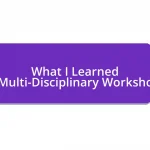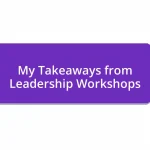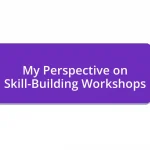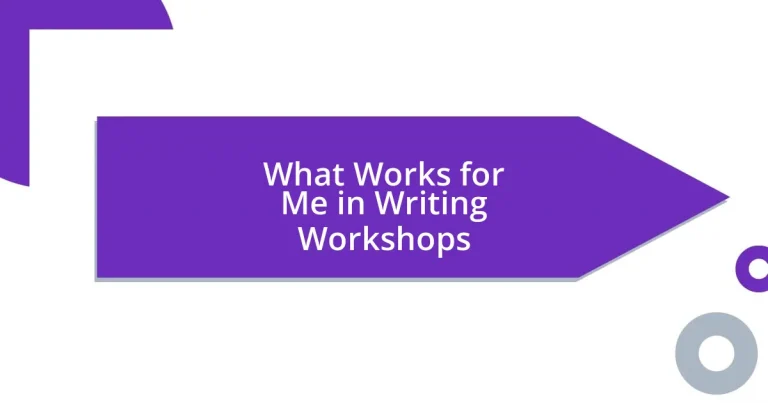Key takeaways:
- Writing workshops foster a supportive community that enhances motivation and creativity through shared experiences.
- Key elements of effective workshops include an inclusive environment, balanced guidance, and diverse feedback methods that promote growth.
- Techniques like the “sandwich method” for feedback and regular goal setting are essential for both constructive critique and continuous improvement.
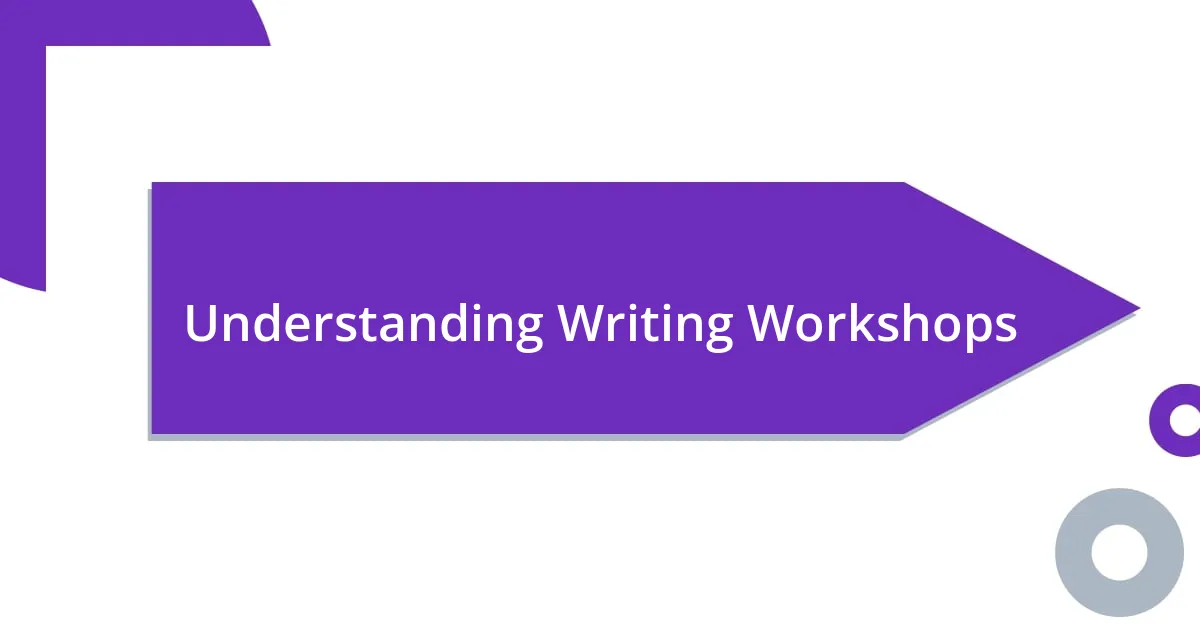
Understanding Writing Workshops
Writing workshops can be a transformative space for both budding and seasoned writers. I remember my first workshop vividly—it was nerve-wracking to share my work with others, but the supportive atmosphere helped me realize that vulnerability is a vital part of the creative process. Have you ever felt that sense of community? It’s incredible how sharing our stories can foster connections we didn’t know we needed.
In workshops, you not only hone your writing skills but also learn to give and receive feedback effectively. I’ve discovered that constructive criticism is a gift—one that challenges my perspective and pushes my writing to new heights. This exchange of ideas among peers can spark inspiration; sometimes, a simple comment about word choice can lead to an entirely new direction in my piece.
Moreover, writing workshops often encourage exploration and risk-taking, fostering a sense of freedom that’s hard to find elsewhere. I’ve pushed my boundaries and experimented with genres I never considered before—like poetry or non-fiction. Isn’t it thrilling when you step outside your comfort zone and discover a new facet of your creativity? It’s not just about improving; it’s about discovering the depth of your voice.
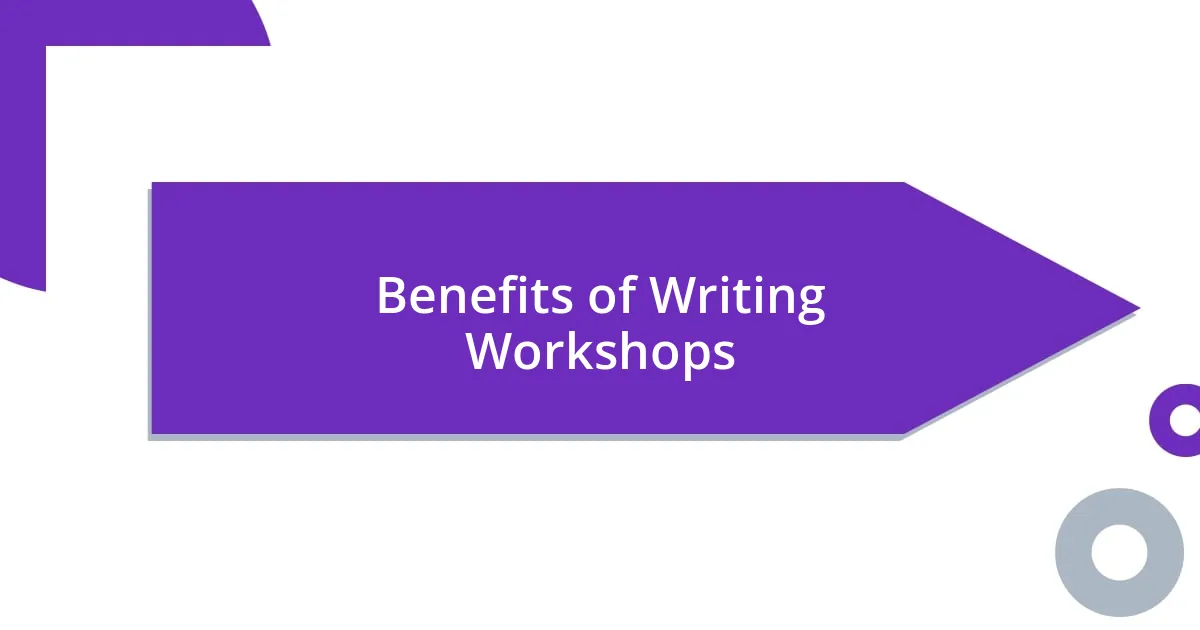
Benefits of Writing Workshops
Writing workshops offer more than just skill development; they create a nurturing environment where writers can flourish. I recall a particularly eye-opening session where the facilitator encouraged us to explore our emotional triggers. That day, I not only learned to articulate my feelings on paper but also felt a profound connection to others who shared their struggles. It’s these shared experiences that truly highlight the emotional benefits of participating in a workshop.
- Community Support: The sense of belonging can significantly boost your motivation.
- Diverse Perspectives: Different voices and experiences can ignite new ideas.
- Personal Growth: You cultivate not just your style but also confidence.
- Explorative Feedback: Receiving various viewpoints can reshape your narratives in unexpected ways.
- Creative Freedom: You can experiment with genres, themes, or styles without the fear of judgment.
It’s fascinating how writing alongside others can illuminate paths you never knew existed! These benefits become increasingly valuable the more you engage, transforming your craft and perspective.
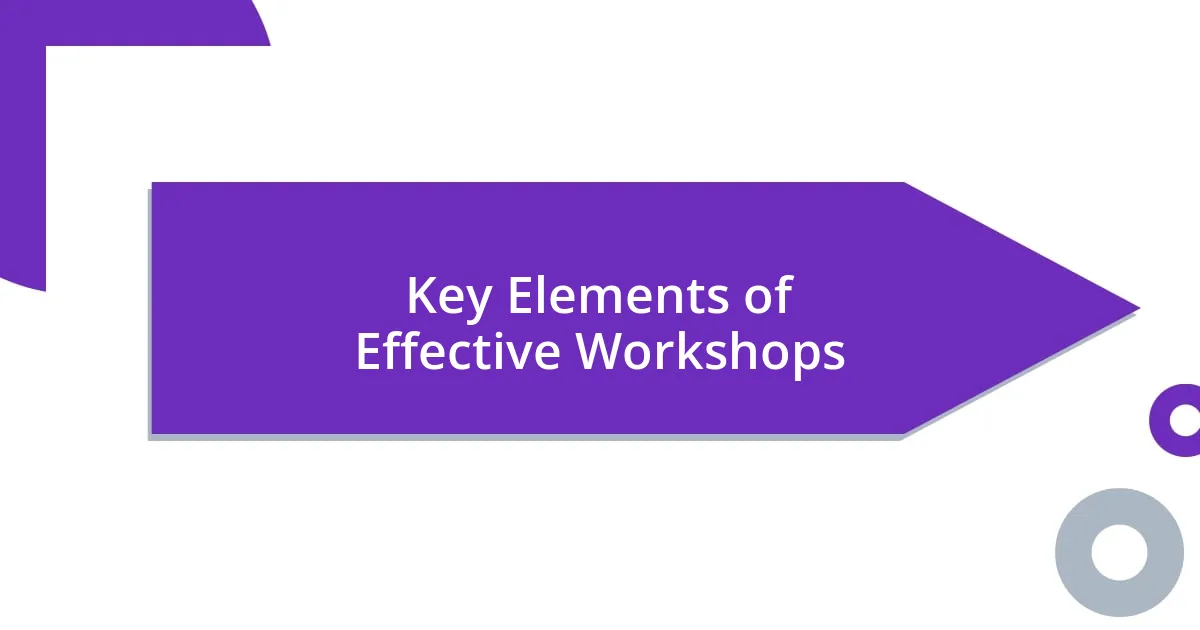
Key Elements of Effective Workshops
Effective writing workshops share key elements that enhance the experience for participants. One of the standout features is an inclusive environment where everyone feels safe to express themselves. I distinctly remember a workshop where participants were encouraged to share personal stories. This openness allowed me to feel more comfortable sharing my own work, ultimately transforming my writing process. Have you ever felt that kind of freedom? It invigorates creativity and fosters trust among writers.
Another critical element is the balance of guidance and autonomy. In one workshop, the facilitator provided us with prompts that sparked ideas, yet allowed us ample time to explore those ideas independently. This autonomy not only helped me develop my voice but also taught me the importance of self-direction in my writing journey. Striking this balance can be incredibly empowering, don’t you think? It’s about having a safety net while also soaring on your own.
Finally, effective workshops incorporate diverse feedback methods. I’ve come to appreciate workshops that encourage peer-to-peer feedback alongside facilitator input. In one memorable session, we divided into small groups to critique each other’s work. The variety of perspectives opened my eyes to different approaches, helping me refine my piece in ways I hadn’t anticipated. Isn’t it fascinating how collaboration can lift our writing to new heights?
| Key Element | Description |
|---|---|
| Inclusive Environment | A space where participants feel safe to share and connect. |
| Guidance and Autonomy | Balanced prompts and independent exploration encourage personal growth. |
| Diverse Feedback | Encouraging varied perspectives enriches the critique process. |
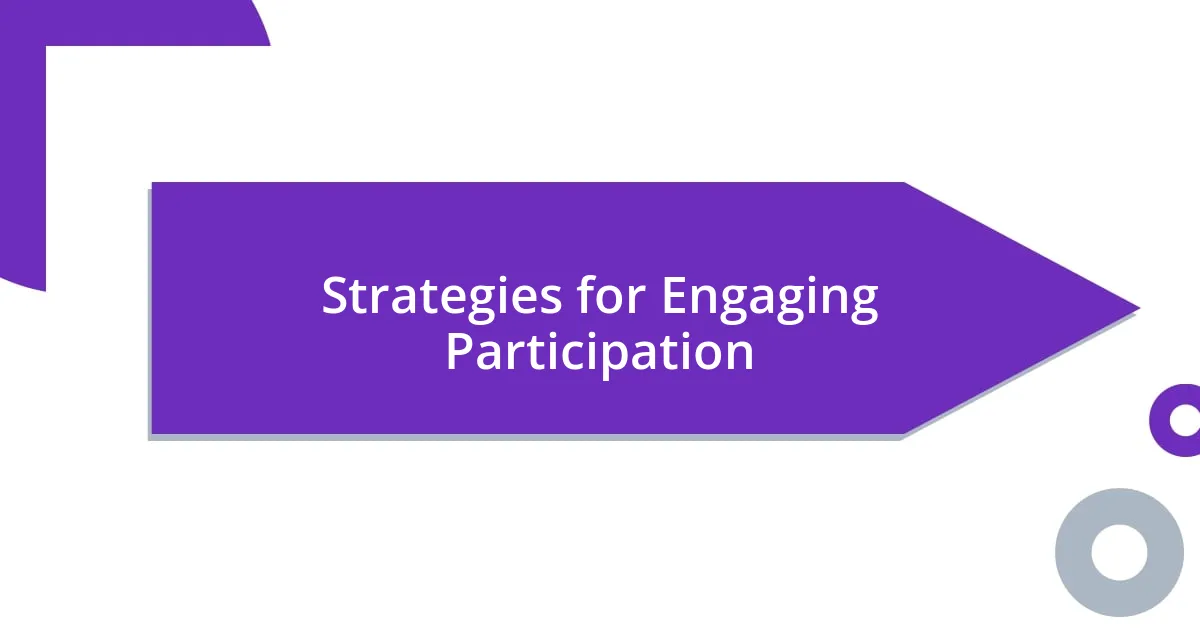
Strategies for Engaging Participation
One strategy I’ve found effective in engaging participation is the use of icebreakers. In one workshop I attended, we paired up and had to share a bizarre or fun fact about ourselves. This led to a lot of laughter and created an instant sense of camaraderie. Wouldn’t you agree that starting on a light note can break down barriers and encourage openness?
Another powerful approach is to incorporate hands-on activities that connect with the writing prompt. I remember a session where we created mind maps based on our story ideas. The process sparked conversations that flowed naturally, and everyone eagerly jumped in to share their visions. Have you ever felt that kind of collective energy in a group? It’s like a wellspring of ideas, and suddenly everyone feels like they have something valuable to contribute.
Lastly, fostering a culture of encouragement is crucial. I once experienced a workshop where participants were asked to share something positive about each other’s work before diving into critiques. This approach not only built trust but also highlighted strengths first. Can you imagine how uplifting it is to receive that kind of support? It transforms the feedback process from daunting to collaborative, making participation feel much more rewarding.
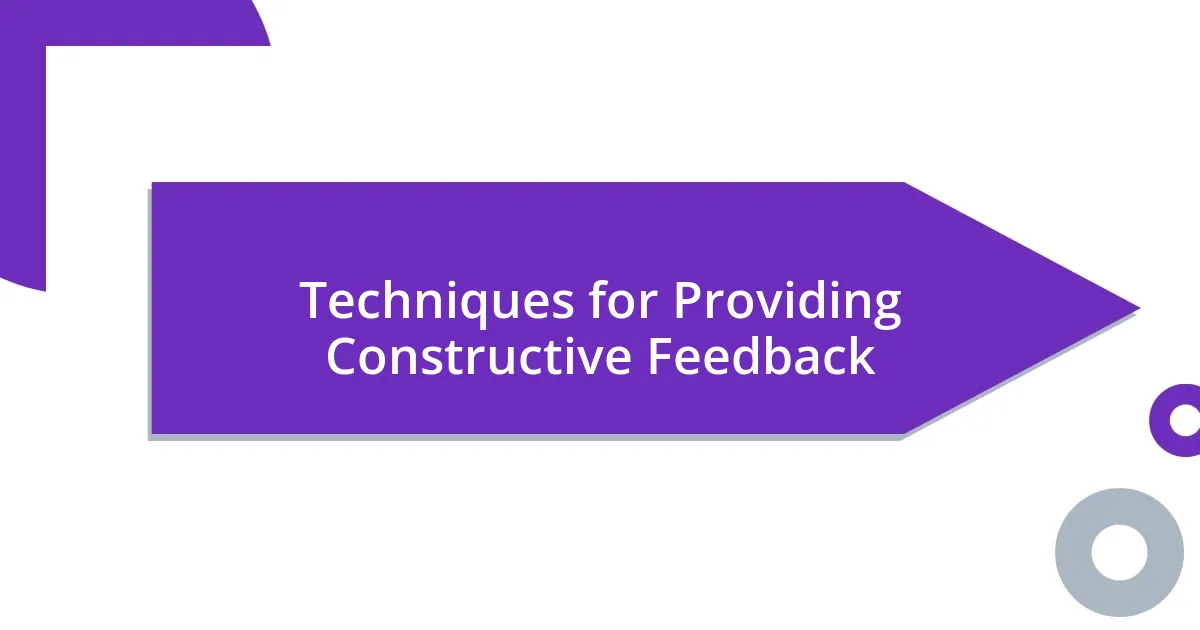
Techniques for Providing Constructive Feedback
When it comes to providing constructive feedback, I find that the “sandwich method” works wonders. This approach involves placing a piece of criticism between two positive remarks. I recall a workshop where my poem received feedback this way, and it felt less disheartening. The positive comments softened the blow and made me more receptive to the areas I needed to improve. Have you ever noticed how much more effective feedback can be when it’s framed positively?
Another technique I’ve used is to ask open-ended questions, which encourages deeper reflection. Instead of stating, “This part doesn’t work,” I might say, “What were you aiming to convey in this section?” This not only prompts the writer to think critically but also opens an engaging dialogue. In one workshop, this approach led to a fantastic discussion about themes, and I could see the writer’s excitement as they unraveled their thoughts. Don’t you just love it when a conversation triggers new insights?
Lastly, I always emphasize the importance of specificity in feedback. Instead of making vague statements like “This needs work,” I try to pinpoint exactly what feels off, whether it’s character development or pacing. I remember critiquing a short story once, and by highlighting specific lines that resonated with me along with areas that needed tightening, the writer left with a clear roadmap for revision. Isn’t it incredible how targeted feedback can create a path forward in the writing journey?
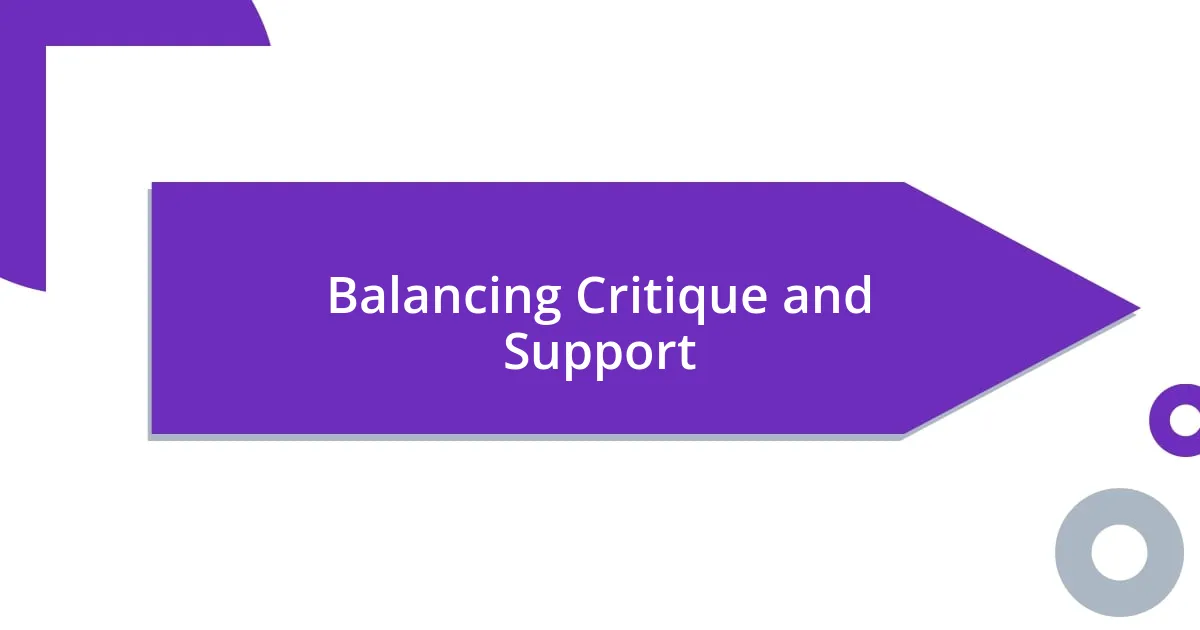
Balancing Critique and Support
Creating a balance between critique and support is vital in a writing workshop. I remember a moment in a session where criticism felt almost paralyzing. However, when the facilitator guided us to acknowledge what we enjoyed in each other’s work first, it shifted the mood entirely. I couldn’t help but think—how often do we focus solely on the negatives, neglecting the positives that truly motivate us?
In my experience, it’s all about timing. I once participated in a group where we divided feedback into two stages: initial responses and then deeper critiques after everyone had spoken. This allowed for a nurturing environment first, letting everyone bask in validation. I often wonder if this kind of structure can change the way writers perceive their own work. It certainly felt like a revelation for many of us, shifting our perspective toward growth rather than fear.
Moreover, I’ve found that celebrating progress, no matter how small, fosters a supportive atmosphere. I vividly recall a workshop where after each round of readings, we shared our own personal breakthroughs or “aha” moments. This practice not only encouraged vulnerability but also reminded us of the shared journey we were on. Doesn’t it feel wonderful to acknowledge not just where we want to go, but how far we’ve already come? It’s this blend of celebration and constructive critique that truly nurtures writers.
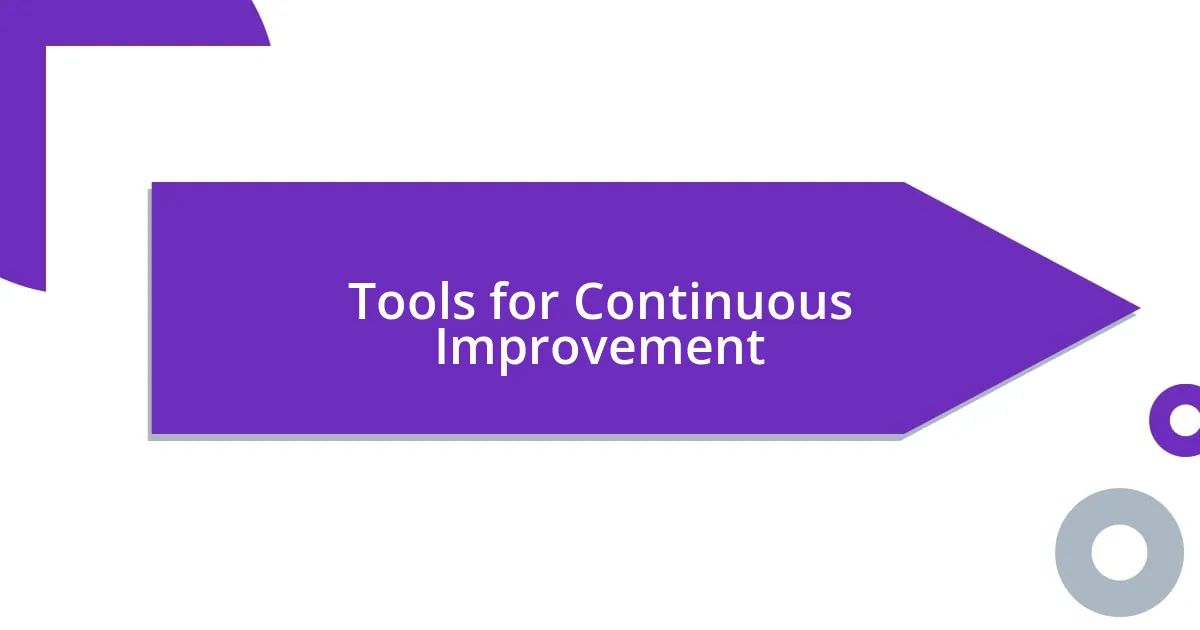
Tools for Continuous Improvement
One tool I’ve found invaluable for continuous improvement in writing workshops is regular goal setting. For example, during one workshop, we each crafted personal writing goals at the start. As time passed, I’d check in with my goals at the beginning of each session, and it truly held me accountable. Have you ever set a goal and then felt that surge of motivation when you see yourself working toward it?
Another powerful technique is the use of writing prompts tailored to specific areas of improvement. I remember a workshop that challenged us with prompts focused on character development. The experience not only pushed me out of my comfort zone but also revealed aspects of my writing I hadn’t previously considered. Isn’t it amazing how a simple prompt can unlock new levels of creativity?
Finally, I’ve found that maintaining a feedback journal is an underrated yet effective tool. After each workshop, I jot down key takeaways from the feedback I received and reflect on how to apply it moving forward. There was one session where I noted patterns in the critiques I received, which helped illuminate recurring themes—like my habit of over-description. Seeing those patterns in black and white made a significant impact on my writing. Doesn’t it feel empowering to have tangible insights to work with?
